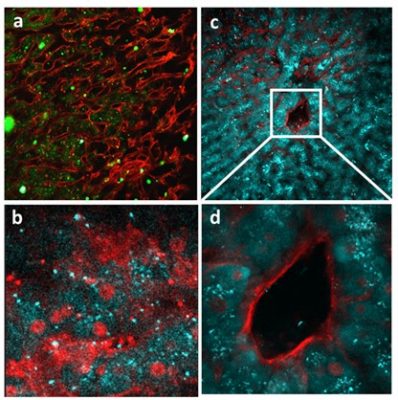ChromaTwist Probes for Multiphoton Microscopy
The advent of immunotherapy and stratified medicine has posed new challenges for imaging human tissues to select optimal patient groups for treatment with bespoke biologicals. Multiphoton Microscopy is regarded as the method of choice for imaging and analysing complex biological interactions in human tissues because it is uniquely suited to perform experiments with minimal invasion over long time periods and length scales.
Current commercial fluorescent probes are used for Multiphoton Microscopy, originally developed for fluorescence or confocal microscopy, are used but have low brightness due to low multiphoton excitation efficiency necessitating the need to use high power lasers.
ChromaTwist is developing new fluorescent probes specifically designed for Multiphoton Microscopy with biological tissues. These probes have:
- High brightness and photostability in multiphoton microscopy
- Low cytotoxicity and molecular stability in biological medium
- Emission across the visible spectrum to maximise multiplexing capabilities
- Reactive functional groups for conjugation to biomaterials, including antibodies.
ChromaTwist dyes are able to absorb two photons of 825nm light and emit across the visible spectrum. ChromaTwist has collaborated with researchers from the National Centre for Replacement, Refinement and Reduction center of animals in research (NCR3), enabling perfusion of a whole human liver with a CTIR series dye and image a section with 825 nm light.

To find out more about ChromaTwist technology or see how it could be adapted to your needs please contact us for more information.
